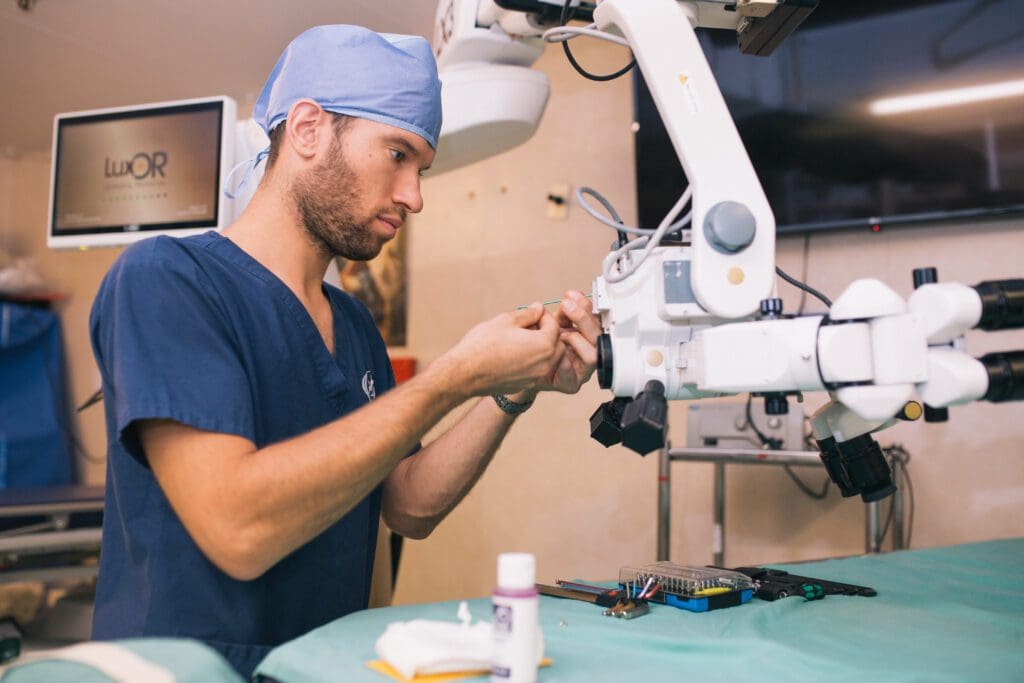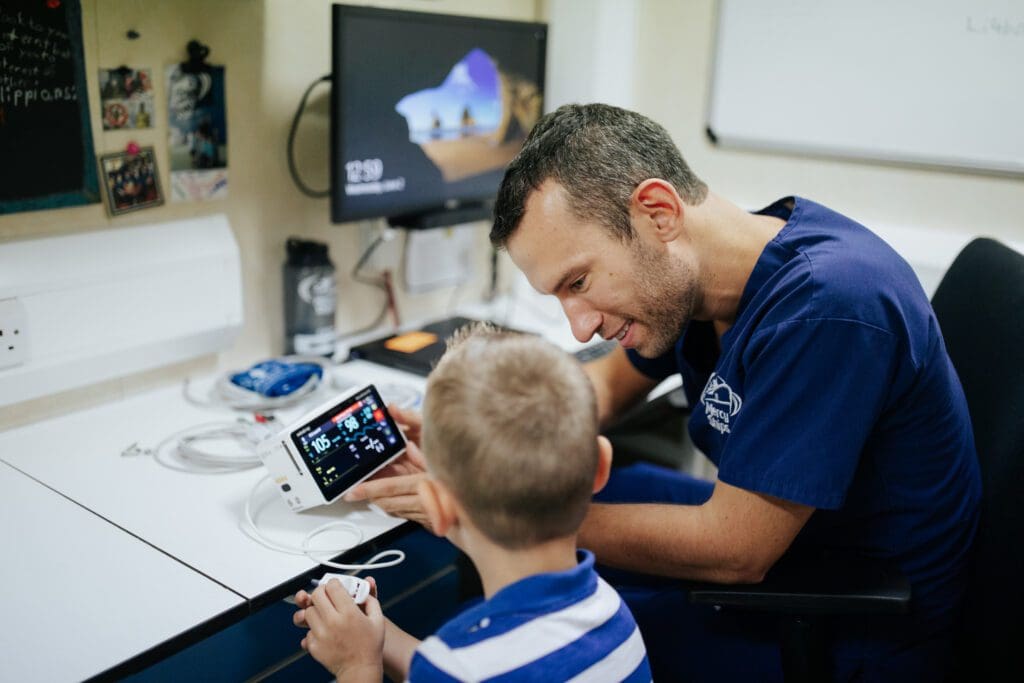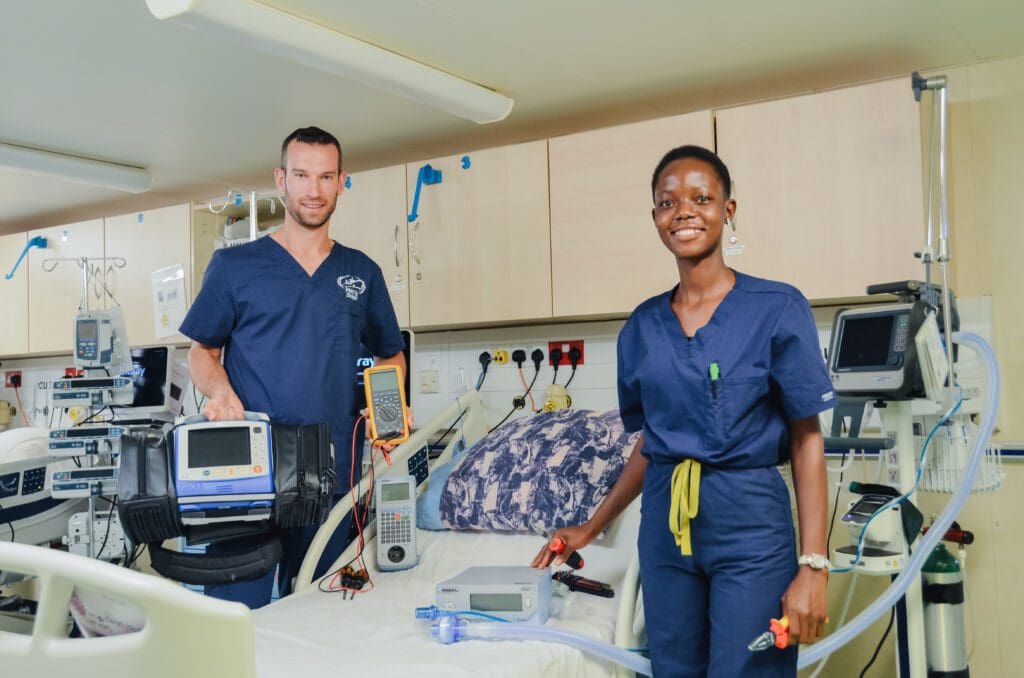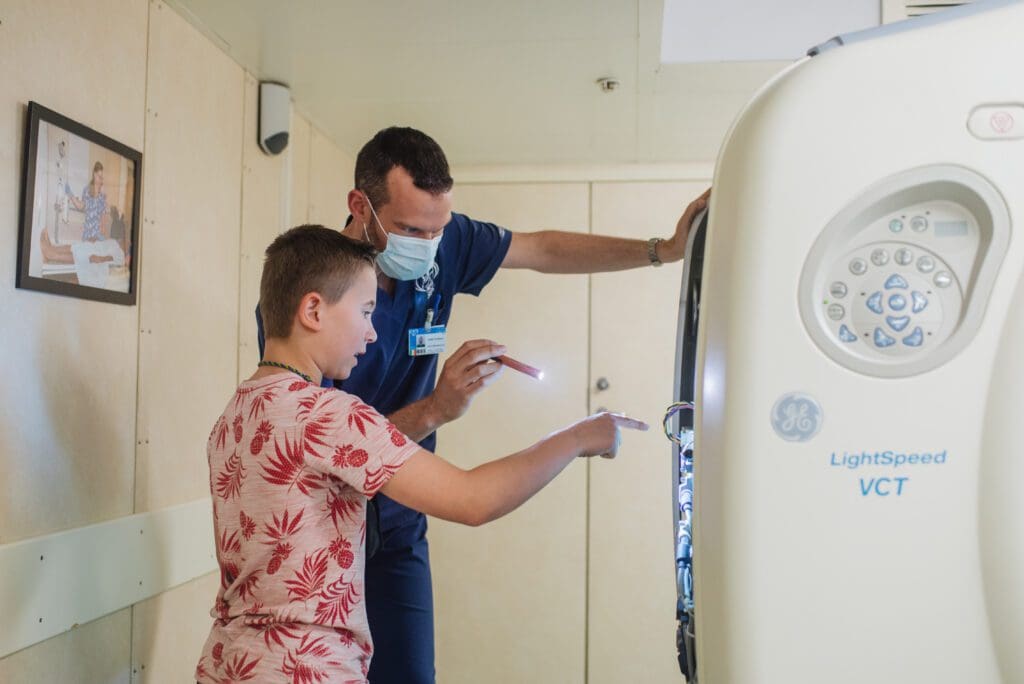Life working as a Senior Biomedical Technician
Guido Kortleven worked in the Netherlands leading a team of Biomedical Technicians. He also has experience in IT for medical systems.
He then decided to go out in the field working as a Biomedical Technician and joined Mercy Ships. His family are with him full time.
A Dutch Senior Biomedical Technician with 8 years in a Rotterdam hospital and 3 years on a hospital ship


Background before working as a Biomedical Technician
Could you give a brief description of your background and what led you to study healthcare technology and then work within the field as a Biomedical Technician?
Helping others has had my interest for as long as I can remember. When I was in High School, different subjects caught my attention. I loved biology, but also physics and chemistry. This all came together when I studied healthcare technology.
After an internship during my third year of study in a Biomed department in a hospital, I was convinced that this was the right field for me. Taking care of people, while working on a variety of equipment. Never a dull moment. Continuous education, to keep up with the newest technology.
I was able to work part time in that same hospital, whilst studying. It helped me a lot to apply what I learnt in university directly in real life. It helped the other way around too. When I needed to do an assignment for university, I had easy access to all kinds of information and companies to accomplish it well.
First job working as a Biomedical Technician
What was your first full time job?
Just before I graduated, I was asked to return to the hospital, but now in the role of manager of the Biomed department. I asked others for advice and thought for a long time about that step: right out of university, overseeing 8 Biomedical technicians and managing 6000 pieces of medical equipment with a total value of €32 million. It was quite a responsibility and a rocket start to my career.
I stayed in that role for eight years, which allowed me to see the long-term results of decisions that I made.
Looking back, it prepared me really well for the work on board of a hospital ship, where all aspects of the hospital need to be covered with only 2 or 3 Biomedical technicians.
For more than 3 years now I have been working as Senior Biomedical Technician with Mercy Ships. First, I was on board of the M/V “Africa Mercy”, later also on the M/V “Global Mercy”, the world’s biggest civilian hospital ship.
Childhood interests
Were you interested in science and engineering when you were a child?
Technology has been my interest since I was born.
My family remembers me walking around with a bag of power cables and any other electronic stuff that I could get my hands on when I had only just started to walk.
One of my older brothers who is now a teacher spent time with me to help me work on electronic things.
Also, whenever any of my brothers or sister bought a new house, I was involved in helping with all kinds of jobs, like painting and removing wallpaper, but later also small electrical jobs.
I started doing this from when I was six. So, over the years I learnt a lot by being hands-on.
When I was 14, I started a side job on Saturdays and during the holidays, at a tree nursery. There too, I was soon involved in maintenance of the equipment.
Hobbies
Do you have any hobbies or interests which are technical or involve using your hands for detailed and precise work?
I don’t have a lot of spare time for hobbies now, but I really enjoy model kits. I started with self-built RC (remote control) models. Then later when we had children, I moved to little trains. But once I get more time, I will definitely move back to functional RC models. It’s so nice to create an RC model with all kinds of details, and to make it function like the real thing. The building process is more important for me than the actual sailing or driving.


The healthcare industry and working as a Biomedical Technician
Was it important to you to work in an industry which was caring/people related?
It’s very important to me to do meaningful work.
What I mean by meaningful work, is helping others. I believe we are here on earth for a reason. Not just to make (a lot of) money, enjoy it and die. In the field of (field) engineers, it’s easy to make a lot of money, since there is a worldwide shortage of good engineers. My inspiration comes from Jesus, who came to this earth to help others, totally selflessly.
Inspiration
Has there been a particular person who has inspired you?
I had the privilege of meeting Don Stephens, the founder of Mercy Ships. Back in 2017 he was in The Netherlands sharing his journey, and how he came up with the dream to start Mercy Ships. The struggles he shared and the lessons he learnt were very applicable to us at that moment. Later when I spoke with him in person, I was amazed with his ability to level with the person in front of him. Don speaks with presidents and world leaders but has the same listening ear for the volunteers on board. He is a real inspiration to me, in following his faith in God and loving others, that is reflected in his attitude.
Typical day on ship working as a Biomedical Technician
What’s your typical day like on board ship?
Usually, we start in the morning with the team together. We pray for a new day, review what we need to do, check if there are any new work orders. And we make a plan for the day.
I usually start with answering some emails. Because our International Support Centre is based in Texas and the ship in Africa, we always have a 5-6 hours’ time difference. Therefore, a lot of communication happens via email.
During the day I help other Biomedical Technicians, perform their jobs. I give advice to users about use of medical equipment or to department heads about replacement of equipment. Sometimes I need to spend some time ordering parts. Since we started using the parts module of our Computerized Maintenance Management System (CMMS), I spend less time in reordering parts. That’s because all details, like OEM numbers and suppliers, are available in the database.
During the day, nurses walk in to get a new SpO2 sensor (measures blood oxygen saturation) or bring small pieces of equipment that are broken.
How much of your time is spent hands-on and how much with admin, managing and other tasks?
At the moment I guess I spend 75% on managing and admin tasks and 25% hands on. That does fluctuate though. At the beginning and end of a field service (Mercy Ships operates 10 months per year in one country and uses the other 2 months for maintenance and sailing to a new country) I spend more time hands on, because we need to secure or unsecure all equipment before and after the sail. Also, when new Biomeds start, I do more hands on, to help them getting started.
Leading a team and working as a Biomedical Technician
You are a small team at sea.
Who gives you support when you need it?
Usually, companies are very helpful once they understand we are on a ship, with limited support. We have connections with a number of other field service engineers from companies who are willing to offer support remotely.
Does it make you more of a team? Do you become more skilled?
The team on board is really close. We have 3 Biomeds (1 Senior Biomedical Technician and 2 Biomedical Technicians) and we all need each other. We share a lot of knowledge together. I have definitely become more skilled, in the variety of equipment. However, it’s impossible to become very skilled in one particular type of equipment.
How much do you have to improvise?
We try to select the right equipment and order spare parts from the beginning.
We also think about alternative scenarios:
What if this fails?
What other options do we have?
In that way we are prepared, and don’t have to improvise a lot when it’s really needed. We keep patient safety in mind in everything we do, so that requires improvising at a higher level. However, we don’t want to compromise patient safety, so knowledge is really important. We need to be able to weigh the risks versus the benefits, when we improvise.


Most challenging part of the job as a Biomedical Technician
What do you find most challenging when you are working?
One of the biggest challenges is the supply of spare parts here in Africa. It can take weeks or months before we have the parts we ordered. But that is also what local hospitals are facing here daily.
So, it motivates me to be part of an organization that helps strengthening healthcare systems. Not only helping the patients, but we are also focussing on strengthening the whole healthcare system.
Is your role ever uncomfortable because you are on the sea?
No, when we are at sea, we are usually not working in our biomedical workshop. When we are in port, you can sometimes feel that you are on a ship, because of the movement of the ship, but that is also limited.
Family
Most field engineers miss their family because of the travel involved with their job. You have your wife and three sons with you.
How does this make life better?
I spend only 2 minutes every day on my commute from my cabin to my workshop. I can say, I don’t waste a lot of time traveling or in a traffic jam, like other field service engineers do. That is one important part.
The other advantage is that I can easily take my boys downstairs to the hospital and show them about my job. I am raising little engineers.
What are the challenges that you as a family face?
As a family we are far away from other family and friends. The flip side is, that we make many new friends from around the whole world here on board.
We don’t have unlimited freedom on board. There are rules to make it possible to live with many other people (450 volunteers on the Africa Mercy and 650 volunteers on the Global Mercy). With our children on board the ship that is not always easy. However, our children are growing up with so many life lessons that others will probably never learn, and that compensates a lot.


Making a winner
What are the ideal qualities to be successful working as a Biomedical Engineer?
I think that there are four key qualities:
Be curious, never stop learning.
Always strive for the best possible.
I believe the motto of every Biomedical Engineer, should be
“So in everything, do to others what you would have them do to you”.
Take care of the medical equipment in such a way that you would be confident to be treated with it if you were a patient.
As well as specific technical skills, how important are people and communication skills?
Communication and people skills are as important as technical skills. I have read some research, which stated that around 70% of the work orders in a hospital are user related. You need to have the skills to explain well to a nurse or doctor what went wrong, so that you prevent it from happening again.
Working on a ship
What additional qualities do you need to work on a ship?
You need to have discernment to know what you can do. If you don’t have the knowledge or experience for a certain task, but you are the only one who is able to fix it. Then, you need to have the confidence to get it done, but you should not be reckless. It’s a very thin line.
I always think in steps:
Can I reverse this, if I do something wrong?
Can I test to see if the result is what I expect?
If yes, we go ahead and continue. If no, what else can we do?
Advice for working as a Biomedical Technician
What advice would you give to other Biomeds for:
Fixing a critical piece of equipment surrounded by other staff with patients waiting?
Keep calm. I always ask the staff to explain to me what went wrong. Is it safe enough to continue? If yes, I pull out and return when the surgery is done. In that way I try to maintain a calm environment. That is the easiest way to work effectively. Fast is not always safe, sometimes it’s better for a patient to wait and be safe, than to rush and take risks. When you know what you are doing you can make the right decisions. That’s why it’s important to keep learning.
Dealing with more than one urgent request at the same time?
Try to think about a safe alternative. I always ask the requester: when do you need it again? Try not to go based on assumptions, but on information provided by the user. If you still don’t know the answer, use a risk assessment tool. What is the function of the equipment you need to work on? If it’s life saving it’s more important than diagnostic equipment for example.
Answering questions whilst working on a piece of equipment?
If you are a woman, you can probably do both at the same time?
In general, I would recommend, to ask for a moment. Then you can finish the step you are working on at that moment, and make it easier to continue, when you are done.
Experience at sea
Why would you recommend getting experience on board a ship?
If you want to rocket boost your career, I wouldn’t recommend serving on board a hospital ship in Africa. It’s more difficult to get training and exchange experience with other Biomed colleagues.
But when you are willing to serve others that don’t have access to safe surgical care otherwise, work with dedicated volunteers from all around the world, and have a unique experience, I would definitely recommend checking out opportunities on Mercy Ships to see how you can serve on board one of our hospital ships.
What comes next
How do you think you will adjust to working on solid ground when you leave the ship?
I have seriously no idea.
We have served for over 3 years on board now and will continue till summer 2023 at least. I am not really thinking about the next step yet.
Further Reading about Biomedical Engineers and Technicians
Deborah Nutsugah a Hospital Ship Biomedical Engineer
Mercy Ships Engineers Find Purpose Volunteering on Board Civilian Hospital Ships


Responses